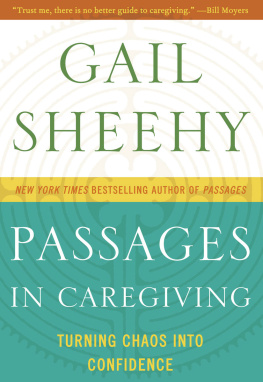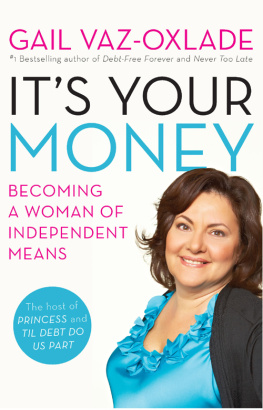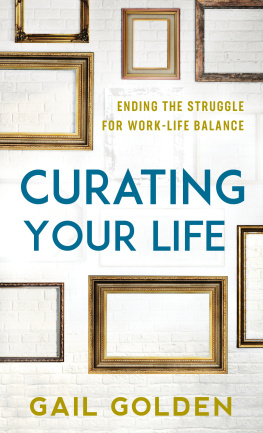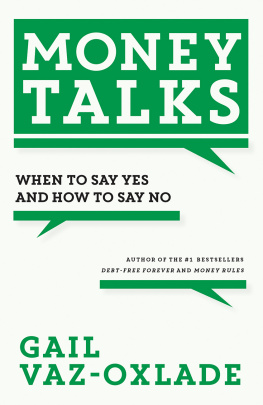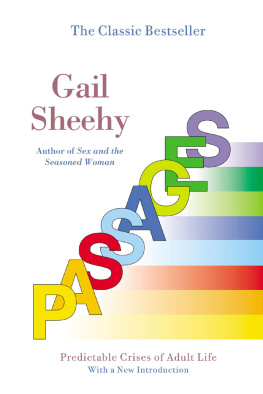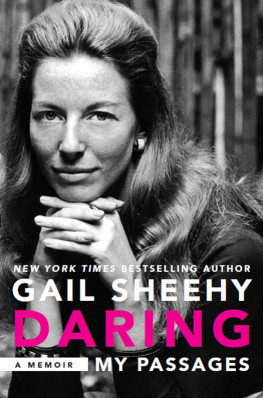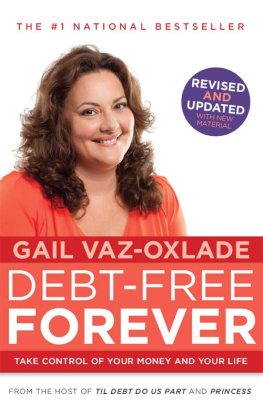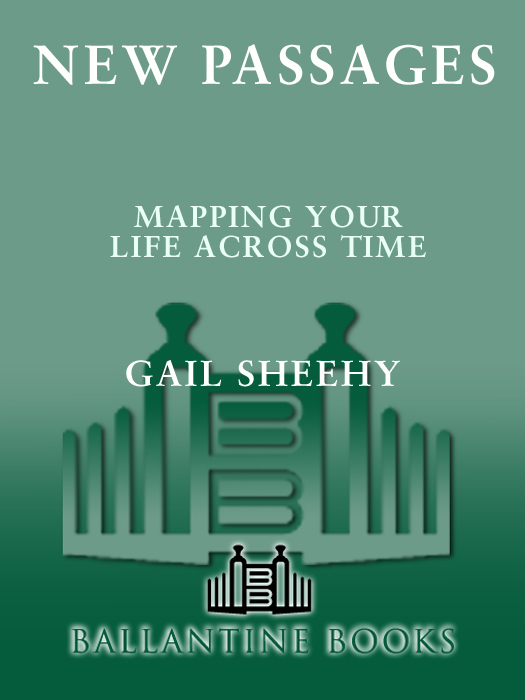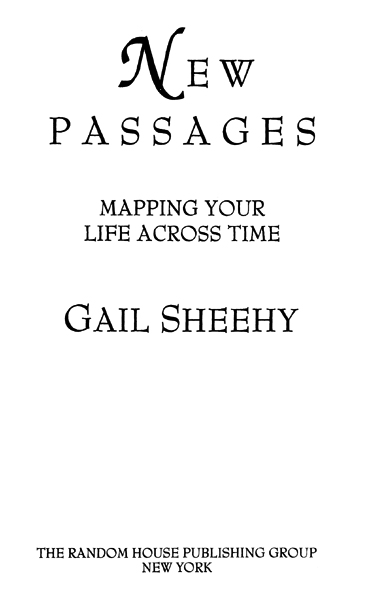More praise for New Passages
Sheehy is a top-notch reporter. She does a service with what she herself would call pioneer work in late adult development, a largely unexplored terrain.
The Boston Globe
There are gold nuggets of personal stories in the book that rival the best literature. Consider it a sort of cosmic Thomas Guide with exquisite storytelling.
Los Angeles Daily News
A good book on the psychological and physical journey of aging Sheehy has done her homework. She conducted extensive surveys of professional and working-class Americans, developed statistical profiles of age groups with the U.S. Census Bureau, and consulted with top-notch researchers.
The Philadelphia Inquirer
Sheehy is out to rock the culture again.
New York Daily News
New Passages has a lot to interest the reader who wants to know how to live the rest of a life that may last much longer than in the past and that may have to be lived with fewer economic resources.
The Houston Chronicle
Sheehy turns out to be a good guide to lead us through this brave and sometimes slightly ridiculous world of what passes for adulthood today.
Newark Star-Ledger
The range and profound human interest of the material, and Sheehys dynamic, optimistic presentation of it, are such that it is almost impossible to imagine who would not be able to draw encouragement and sustenance from this sweeping vision of our personal futures.
Publishers Weekly
NOTE FROM THE AUTHOR
I first began research on the new passages of middle life for men and women about seven years ago. By middle life I refer to the mid-forties to mid-sixties, the most unrevealed portion of adult life. The idea was to map out the predictable crises of this territoryan extension of my long fascination with the adult life cyclebut after the first seventy-five interviews, I had to pull up short. I had come upon a black hole of ignorance and denial, the silence called menopause. Before I could hope to understand the larger issues of middle life for contemporary women and men, I had to try to confront the cultural taboo surrounding the Change of Life. So what was meant to be a chapter in this book took on a life of its own.
No time to make a passage myselfor so I thought. People were ready to have the conversation about menopause, and The Silent Passage became a conversation piece. Suddenly I was in constant demand to make speeches to help spotlight the many new womens health centers sprouting up across the country. It was a thrill to feel that one was in the right place at the right time, engaging with ones culture. But my own life was overtaken by the full-time job of publicity and public speaking.
At the peak of this razzle-dazzle of pleasant activism, my publisher threw a book party to celebrate The Silent Passages reaching number one on The New York Times best-seller list. I felt almost like an impostor. This book wasnt even meant to be! (In fact, when my husband, Clay Felker, first suggested that I expand on the magazine article I had written about menopause for Vanity Fair, I scoffed, Oh, really, who would want to read a whole book about menopause?)
On the night of the party we were swept up in a gala outdoor garden dinner at an Italian trattoria. It was a mild summer evening. New Yorks literati gabbed with health professionals at checkered tables beneath trees giddily strung with lights. The trees gave way in places to pale lavender sky and faint stars and the suspended evening of endless possibilities that is June. I was a hundred feet off the ground. A wise friend of mine caught me in midair and whispered a warning. She could see the breathless half-finished hellos and airborne kisses, the jittery dance of narcissism.
Be careful, youre becoming stress-addicted, said Pat Allen.
She was right. I had been performing for the previous year as a Little Ms. Menopause. As satisfying as that time was, I had become caught up in the world of externals and increasingly disconnected from what was real and important. The more public the expectations, the more compulsive I tend to become about trying to do it all perfectly, and the easier it is to be thrown by the slightest criticism. All the effort goes into keeping the show going, twenty-four hours a day. Stress builds up; body and mind almost never completely rest. Its a swell antidepressant. But losing myself in hyperactivity is also a classical way to avoid engaging a necessary passage.
And there were now issues I very much wanted to avoid. For one, the news that the husband of a dear friend of mine was battling cancer. When we are on the threshold of a new stage, we are particularly vulnerable to twinges about aging, and 50 is certainly a threshold. When a friend around our own age stares back at the beast, it gives death a human face. The marker event that makes our mortality suddenly feel so real and frightening does not have to concern death or happen to us directly. It can be the abrupt independence of a last child, the enfeeblement of a vigorous parent, a friend who slips from what seemed an unassailable position of success into has-been status and despair.
Since ultimately death cannot be avoided, the real question then becomes: How shall we live the rest of our lives? A hundred years ago that question seldom came up for people beyond their mid-forties. Their proper expectation upon approaching age 50 was to be dead. Today, even though we know intellectually that we can expect to live much longer, our view of life beyond the mid-forties is still colored by mental snapshots of our mothers or fathers at that age: My mother looked tired and, yes, old, at fifty, or My father had his first heart attack at fifty; he was never the same man.
The first glimpses of a midlife perspective usually begin to startle us in the middle of our thirties. Time starts to pinch. I was in my mid-thirties when I began the research for Passages, a book about the adult life cycle that was published twenty years ago (in 1976). It proposed that we continue to develop by stages and to confront predictable crises, or passages, between each stage of adulthood. At that stage in my own life I saw the mid-thirties as the halfway mark, the prime of life. The years between 35 and 45 I called the Deadline Decade, as if we had only until our mid-forties to resolve the crisis of midlife.
I stopped before 50 in Passages. Frankly I found it impossible to picture myself at that age. Like so many others of my generation, I couldnt imagine life beyond 50, and I certainly couldnt bring myself to consider it as a time of special possibility or potential. It had always conjured up moms who slipped into depression or some slope-shouldered fellow sitting in a fishing boat while the world goes by. It was supposed to be a time of winding down. The midlife crisis had long since blown over, and if one hadnt confronted it by then, there wasnt much family or societal support for taking the risk at 50. Careers were settled; one was either coasting toward retirement, resigned to failure, or somewhat patronized as a has-been success. Children were launched. Idealism had faded. Learning was completed. Love was about cuddling or rocking grandchildren, certainly not associated with computer dating or uninhibited sex. Since there were no instructions for what a woman should be after she has finished making babies and getting by on her physical charms, it might just be a sudden Dorian Gray transformation. My own dark fantasy was I would go to sleep and wake up one morning to the


